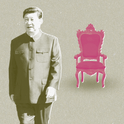Sitting in the Palestine hotel, waiting for the final assault on Baghdad, one of the journalists' favourite games was trying to work out which of the officials we knew would be subject to de-Ba'athification and which would survive in the new regime.
One correspondent, particularly buffeted by the bureaucracy and accused at one stage of being a spy-not a trivial matter at that time-had already drawn up his list for Guant?namo Bay.
But there is another side to this too. Some of us were, and are, concerned about the rough justice that may await Iraqi officials we have got to know quite closely over the years-not at the hands of the Americans or British, but their fellow Iraqis. In the rebellions following the first Gulf war, many Ba'ath party members were beheaded.
On the coalition side there are said to be lists being drawn up of those that the transitional administration can work with and those that will face some sort of retribution. Some better educated Iraqis are worrying that too many guilty officials are going to be drafted into the post-Saddam administration in the name of order and continuity-a re-run of de-Nazification in Germany.
But what would de-Ba'athification mean? The ideology of Ba'athism-secular, vaguely socialistic and Arabist-is unobjectionable. Moreover, before Saddam embarked on his disastrous wars, Ba'ath rule achieved important things for Iraq. It created decent public services; it ploughed money into education for girls as well as boys.
As in much of the communist world, the system made it hard for an Iraqi to progress in any field without belonging to the party. As a result, much of the membership is opportunistic rather than doctrinaire. Many party members, even those in quite high positions, have only the vaguest notions of what the party stands for. That is, of course, because it came to stand for nothing more than power.
Selim, one of the minders provided for the media by the information ministry, left a government department after refusing to join the party. Sitting in my hotel room, he tells me candidly: "What the Ba'ath does is take ill educated men and put them in positions far beyond their ability. All it wants is loyalty and people who will join in the corruption... That is not just at the lower levels. The president and people around him are not educated."
Selim is tense. His wife and children live near the airport where there is heavy fighting. He wonders whether he should bring them to the hotel for safety. (This was before the hotel was hit.) Despite his non-Ba'ath credentials, he fears the coming witch-hunts. "The US will not be able to distinguish between who was Ba'ath and who was not. I worked in ministries, so anyone can come along and say I was one of the bad people. I want change, but I am afraid that people will suffer."
Omar, seconded from the foreign ministry and a party member, moves me out of the earshot of one of the security heavies and whispers: "That man is very bad. He used to work at Abu Ghraib [a prison], he did bad things there." A colleague, Awad, looks up nervously. He is the only man empowered to take the daily fee of $225 from the journalists. He has no fingernails. He, too, is a Ba'ath. None of us dare ask what happened to his nails.
Omar insists that he is not in the same category as the man from Abu Ghraib. "I joined the party because my father was a member, nothing more. I am not political. It's like a club." In the past, Omar would translate long sentences into clich?s like "She said she hates Bush, and all people of Iraq love Saddam Hussein." Latterly, he has been attempting something closer to real interpretation. "It's a matter of adapting, saying the right thing," he smiles. He, and others like him, will have plenty of practice at adapting and saying the right things in the weeks ahead.











